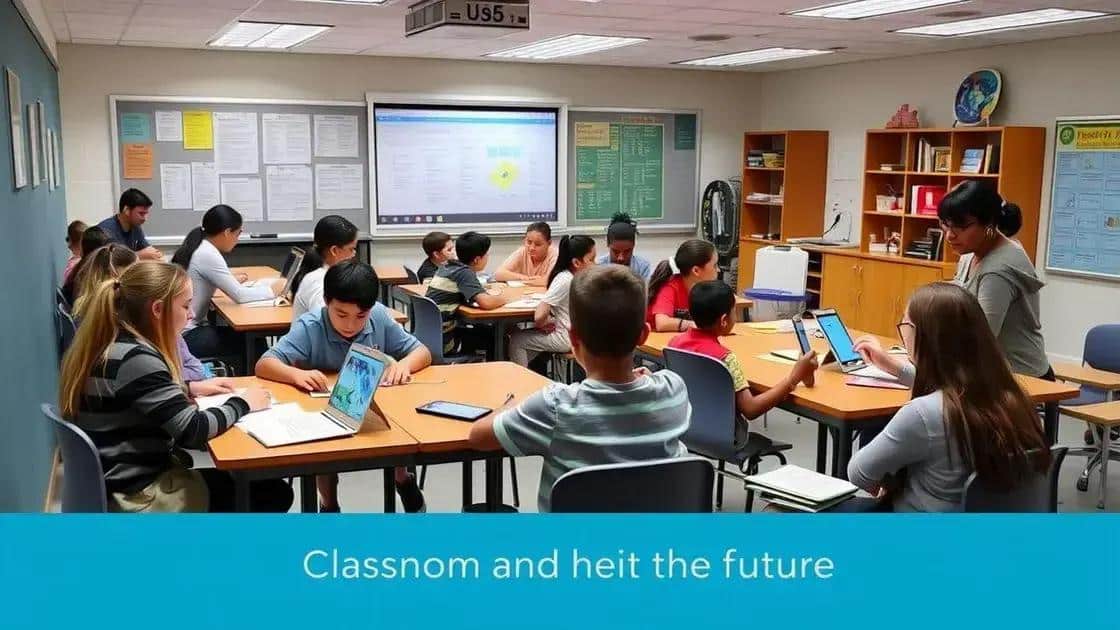National testing proposal faces opposition: what to know

The national testing proposal standardizes assessments to ensure fairness and accountability, but it faces opposition due to concerns about student stress, teacher challenges, and the potential narrowing of the curriculum.
National testing proposal faces opposition as educators and parents voice concerns. How will this affect the education system? Let’s dive in.
Understanding the national testing proposal
Understanding the national testing proposal is essential for grasping its implications on education. This proposal seeks to standardize testing across various states, aiming for fairness and consistency in student assessments.
The move to implement this proposal brings several discussions to the forefront.
Key Goals of the Proposal
Primarily, the proposal aims to achieve:
- Uniformity: To ensure all students take similar tests, regardless of their location.
- Accountability: To hold schools and educators accountable for student performance.
- Data Collection: To gather data that can help improve educational strategies.
Supporters believe this approach will help identify gaps in education effectively. However, some argue that standardized tests may not account for diverse learning styles.
Additionally, the focus on testing could shift the educational experience from creative learning to mere test preparation. This concern is pivotal as parents and educators contemplate how it could influence the classroom environment.
Opposition to the Proposal
As we explore the opposition to the national testing proposal, it’s crucial to understand the range of concerns expressed by various stakeholders. Critics argue that standardized tests can lead to:
- Test Anxiety: Many students may feel stressed or anxious about standardized testing.
- Narrowed Curriculum: Teachers may focus solely on test-related content, neglecting broader learning opportunities.
- Equity Issues: Students from disadvantaged backgrounds may not have the same preparation or resources.
Ultimately, the balancing act between accountability and comprehensiveness remains challenging. This ongoing debate highlights the need to consider all perspectives as stakeholders navigate these changes. Visiting this topic offers insight into the future of educational assessments.
Key opponents and their arguments

Key opponents of the national testing proposal have raised valid concerns that merit attention. These critics include educators, parents, and various advocacy groups who worry about the implications of standardized testing.
Many argue that such tests can create undue stress among students. Test anxiety is a real issue for many young learners. When students focus more on passing tests than on the joy of learning, it can hinder their educational experience.
Arguments Against Standardized Testing
Opponents present several arguments, which include:
- Lack of Individualization: Standardized tests often fail to accommodate different learning styles and needs.
- Narrow Focus: Schools may emphasize test-taking skills rather than a well-rounded education.
- Equity Concerns: Students from disadvantaged backgrounds may face additional barriers in preparing for these tests.
- Resource Allocation: Schools might divert funds to test preparation rather than investing in comprehensive learning resources.
As the debate continues, it’s evident that opposing voices advocate for a more holistic approach to education. They emphasize that success shouldn’t solely be measured by test scores.
Furthermore, these opponents highlight that critical thinking and creativity are often stifled under strict test-focused educations. The importance of fostering a love for learning cannot be overstated, and critics feel that the current proposal may undermine this goal.
Potential impacts on students and teachers
The potential impacts of the national testing proposal on students and teachers are extensive and multifaceted. As this initiative unfolds, it is crucial to explore how it might shape the educational landscape.
For students, standardized testing can influence various aspects of their academic journey. It often creates pressure to perform well, which can result in test anxiety. This stress might hinder their ability to demonstrate true knowledge and understanding.
Effects on Students
Many students may face challenges such as:
- Loss of Motivation: The focus on testing can make learning feel like a chore, reducing students’ enthusiasm.
- Increased Stress Levels: The pressure of high-stakes testing can lead to anxiety and affect mental health.
- Uniform Learning Experience: A one-size-fits-all approach may neglect individual learning styles and paces.
These factors can shape not just academic performance but also interest in school. If students feel disengaged due to testing pressures, they might not reach their full potential.
Effects on Teachers
On the other hand, teachers also feel the impact of standardized testing. Increased accountability can lead to:
- Curriculum Narrowing: Teachers may have to focus on test-related material, limiting creative teaching.
- Job Pressure: Their performance is often linked to student test scores, putting significant stress on educators.
- Resource Allocation Challenges: Schools may prioritize testing resources over enriching learning experiences.
Furthermore, as teachers adapt to this test-driven culture, they may find it more difficult to foster an environment that encourages creativity and critical thinking among students. Ultimately, the ripple effects of the national testing proposal emphasize the need to balance assessment with a holistic approach to education.
Future of educational assessments

As we look toward the future of educational assessments, it’s essential to explore innovative approaches that could redefine how student learning is evaluated. The landscape of education is constantly evolving, and assessment methods must adapt accordingly.
One significant trend is the shift toward more personalized assessments. This approach aims to align evaluations with individual learning needs and styles. Instead of relying solely on standardized tests, educators are considering various methods to assess student understanding.
Trends in Educational Assessment
Several emerging trends may shape the future, including:
- Performance-Based Assessment: Students may participate in projects or presentations that demonstrate their knowledge and skills in real-world contexts.
- Formative Assessments: Frequent assessments can help teachers monitor progress and provide timely feedback, allowing adjustments to instruction as needed.
- Use of Technology: Digital tools can create interactive assessments that engage students while providing valuable data for teachers.
These trends promote a more comprehensive view of student learning. Instead of focusing exclusively on test scores, educators can evaluate critical thinking, collaboration, and creativity.
Additionally, the future may hold the integration of social-emotional learning into assessments. Understanding a student’s emotional and social skills is equally vital in gauging their overall development. This holistic approach recognizes that education goes beyond academic achievement.
Challenges Ahead
However, as educational assessments evolve, challenges remain. Implementing new assessment methods requires adequate training for teachers and resources for schools. It’s essential to ensure that all students have equal access to innovative assessment opportunities.
Ultimately, the future of educational assessments should embrace flexibility, inclusivity, and a genuine understanding of how students learn best. As stakeholders come together to discuss these changes, the goal should be to create assessments that prepare students for a complex and ever-changing world.
FAQ – Frequently Asked Questions about National Testing Proposal
What is the national testing proposal aimed at?
The national testing proposal aims to standardize assessments across states to ensure fairness and consistency in evaluating student performance.
How might this proposal impact students?
Students may experience increased stress and test anxiety, which could affect their overall learning experience and motivation.
What are some concerns teachers have regarding standardized testing?
Teachers are concerned about the narrowing of the curriculum, increased pressure to perform, and the potential for less creative teaching approaches.
What trends are emerging in educational assessments?
Emerging trends include performance-based assessments, formative assessments, and the use of technology to create engaging testing environments.






